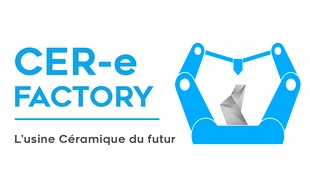CER-e-FACTORY
CTTC is involved in various collaborative projects, and CER-e-FACTORY is one of them.

Towards the Ceramic Factory of the Future
Additive Manufacturing / Ceramic Industries
The CER-e-FACTORY project aimed to develop an innovative technological offering and enter the era of the “factory of the future.”
In a context of strong competition from Asian countries faced by the global industry, the objective of this project was to create an innovative technological offer to help companies in the ceramics and glass sectors meet the challenges of competitiveness and differentiation, and to transition into the “factory of the future” era.
As current production processes and tools no longer meet the needs of European manufacturers—who produce increasingly complex, high-end parts—the CER-e-FACTORY project set out to deliver a new technological and service-based offering by developing a complete digital chain, “from idea to finished part,” for the manufacturing of new “Made in France” products.
The project included support services for transitioning to these new technologies, along with dedicated theoretical and hands-on training for current and future employees in the sector. The digital chain was designed to streamline costs, lead times, and product design cycles, while also enhancing the diversity and quality of producible items (small series, high size/precision). The services and training aimed to facilitate adoption and ensure the long-term integration of this new technology into industry practices.

The CER-e-FACTORY project was co-funded by the European Union under the 2014–2020 ERDF-ESF program. Selected under the 21st call of the Single Interministerial Fund (FUI 21) and endorsed by the European Ceramic Cluster and the Viaméca competitiveness cluster, it also received co-funding from the French government and the Région Nouvelle Aquitaine.
Project duration: 2016–2019
Budget: €2,300,000
Collaboration: Cerinnov, Imerys Ceramics, Saint-Gobain Formula, Alliages Céramiques (geberit), SPCTS (Laboratoire IRCER), CTTC
Results
The CTTC developed new expertise in Robocasting and Binder Jetting processes through the use of plaster and porcelain formulations developed and adapted by project partners.
A small plaster mold was successfully produced using Robocasting. After smoothing the mold’s inner surfaces, a part was cast and demolded successfully. Porcelain and sanitary clay pastes adapted for FDM were also developed, revealing a clear correlation between the paste formulation and the printhead in terms of print quality.
